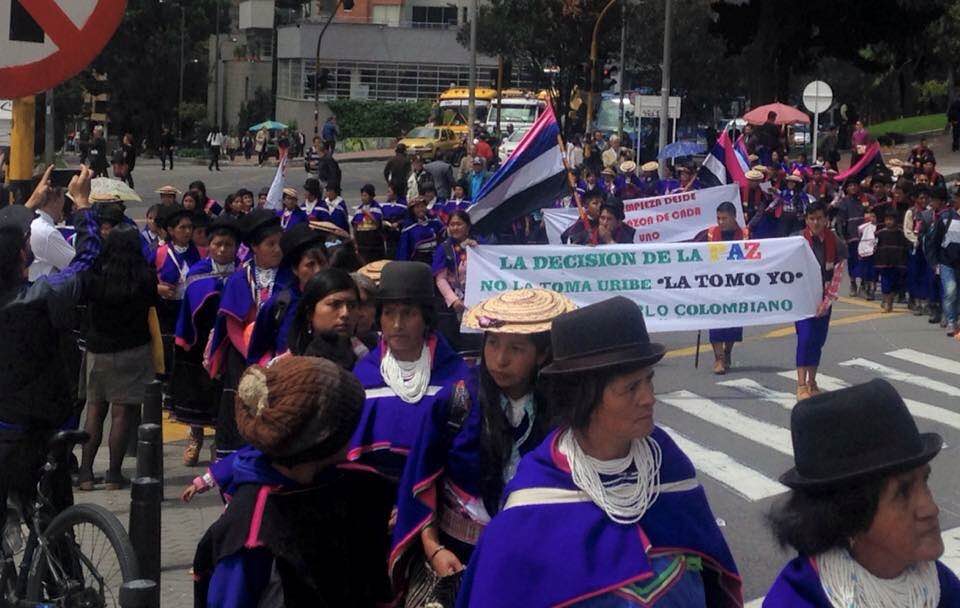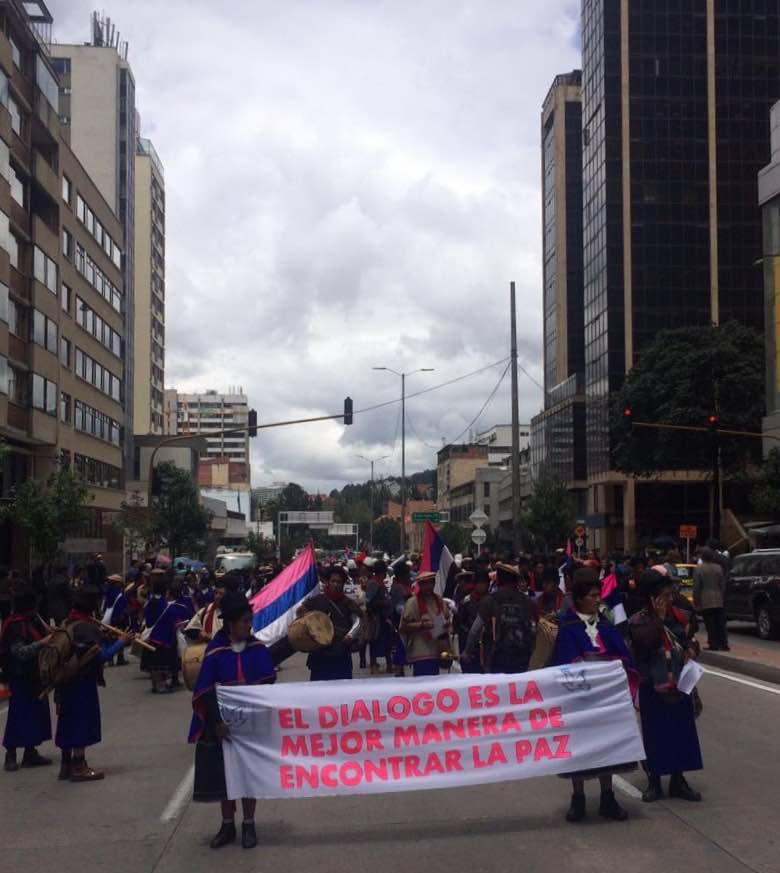An award can be backward or forward looking; this year’s Nobel Peace Prize is both. By awarding this prize in a moment of crisis for the Colombian peace process, it not only serves as a recognition of past efforts made by individuals, but also rescues an agonizing process and truly encourages further collective efforts for peace in Colombia. Beyond that, the Nobel Peace Prize serves as reassurance of an oft-discarded perspective on political conflicts transformation: non-violence.

Supporters of a peace agreement marching in Bogotá. The sign reads: “Uribe does not make the decision about peace, I do.” PHOTO: Gabriel Rojas.
Recognition of efforts made
The Nobel Peace Prize is a pertinent recognition of the individual efforts being made by the current President of Colombia to bring forward a negotiated end to a decades long armed conflict with the FARC-EP. Needless to say, reaching a point of agreement would not have been possible without the tenacious will and work of FARC leaders, victims’ organizations present in Havana, and diplomats from various states and institutions. Their efforts should also be acknowledged.
The choosing of president Santos as Nobel laureate is certainly controversial due to his involvement in war related harms, first when he served as Defence Ministry during the Uribe government 2006-2010 and later as the President of a country at war with belligerent groups. This includes the so-called “false positives” scandal, one of the darkest outcomes of conflict escalation and sate forces degradation in Colombian history. However, President Santos won recognition for his major commitment since 2010 to initiating and keeping alive the peace talks with FARC despite harsh difficulties and opposition.
Santos stands on many people’s shoulders. Behind Santos’ negotiations there lies a conglomerate of demands from civil society and grassroots associations, who for decades have called for the negotiated termination of hostilities with various non-state armed groups. In the case of the current negotiation with the FARC, these organizations have put pressure on President Santos not only to begin the talks, but also to continue to their fruition, and reach an agreement that includes the perspectives of women, ethnic minorities, traditionally disadvantaged and discriminated against groups. A milestone in the history of peace negotiations in Colombia, characterized by pacts between elites.

“Dialogue is the best way to find peace.” PHOTO: Gabriel Rojas
Ethical reassurance
The Colombian peace process suffered a major setback after the victory of ‘No’ voters in a recent plebiscite consulting citizens whether or not they supported the terms of the agreement. As already discussed in detail in an earlier blog entry, following the borderline negative outcome of the plebiscite, the historic peace agreement signed in Havana now more than ever before was in need of solid international support; and what can be a better symbol of solid support than a Nobel Peace Prize?
Beyond recognition to President Santos and needed international support to an agonizing peace process, this year’s Nobel also constitutes ethical reassurance to those who stand for the negotiated transformation of conflicts. To those who contest the legitimacy of physical and political elimination of dissident actors as state practice and have opposed the dedication of public institutions to the discursive creation of “enemies” and their silencing. A practice rooted in the Cold War and common denominator of the last sixty decades of Colombian political history.
This year’s Nobel Prize gives strength to the ideal of celebrating rather than inhibiting diversity. It stresses that there is beauty and value in dealing with conflict in non-violent ways. Colombia is a democratic state which has far stretched its legal justifications for the use of lethal force as means to end the political conflict. And this is no longer defendable.
Seen with a different pair of glasses, this Nobel also gives ethical affirmation to at least three generations of revolutionary men and women. On the one hand to those who have resisted the armed insurgency, struggling to find other ways to fight injustice. On the other hand, to those who from all sides of the ideological spectrum got caught in the armed struggle and wish to find a way out.
Here and now: social mobilization
Today, in the aftermath of the plebiscite, the social demands for peace and inclusion are being invigorated by marching students, victims and indigenous communities who are massively taking them to the streets (#PazALaCalle) in support of President Santos’ negotiation efforts. They push for the maintenance of the ceasefire with FARC and prompt consolidation of the Havana accords. They march and the symbolic power of the Peace Nobel Prize escorts them. Peace by peaceful means (as Johan Galtung coined it) surely deserves Nobel recognition and should be in Colombia to stay. Its people cannot bear one more day of war.